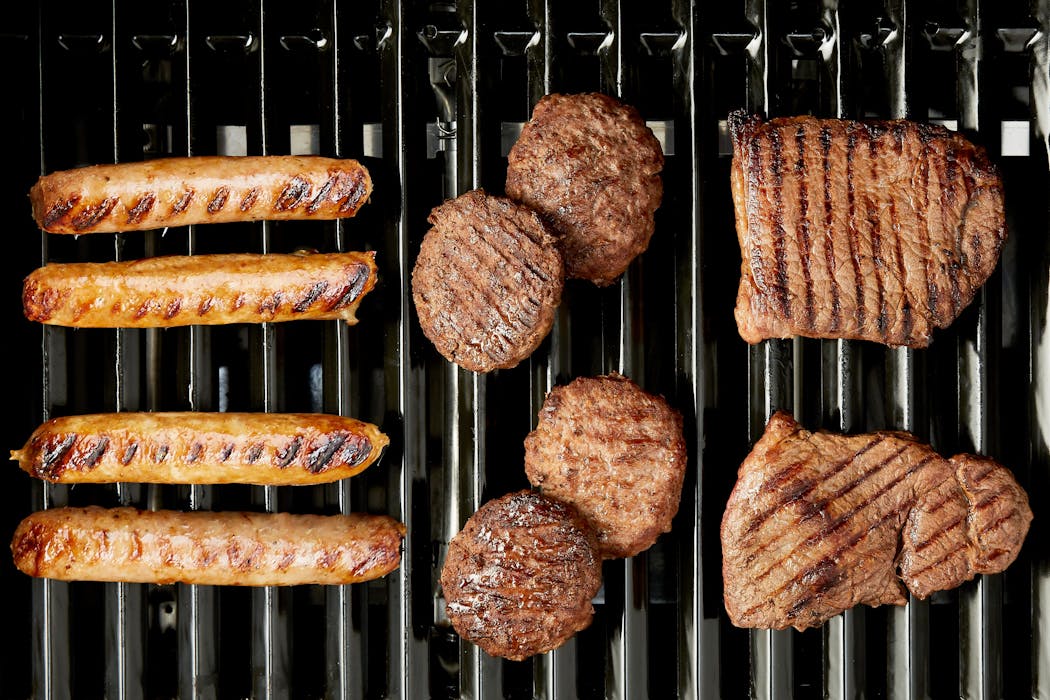The ultimate guide on cleaning your barbecue
Over time, all the grease and debris that falls from the food needs to be cleaned up. Follow these steps to get your outdoor grill clean and ready for barbecue season.
 Back
Back






Over time, all the grease and debris that falls from the food needs to be cleaned up. Follow these steps to get your outdoor grill clean and ready for barbecue season.

Is there any better feeling than grilling your favourite meat, seafood, or vegetable in the heat of the summer and dreaming of the smoky char flavour that you are adding to the meat? The anticipation of taking the first bite of perfect steak (or whatever you daydream about grilling) and the flavour that explodes from it is what drives foodies all winter long. This is the moment that I think about when I roll out my barbecue each Spring from its overwinter storage spot. Unfortunately, when I open it, I realize that all the grime and crusty bits from last season are still in the barbeque. Yuck. That will need to be cleaned before grilling any foods. But how is a job like that best handled? Buckle up, BBQ fans. It’s time to clean your entire barbeque.
Admittedly, it’s a messy job but one that ushers in a summer full of delicious barbecue food. You will need a basket of soapy water, a scraper tool, a barbecue brush, and possibly a pair of gloves to keep your hands clean. The process is similar for both propane and charcoal barbecues except for cleaning the burners (try to find them on your charcoal barbecue!). Follow these steps and you’ll have a fresh, clean grill for a season full of delicious barbeque foods.
Step 1. Disassemble your barbecue.
Don’t worry, you won’t have to break it down to nuts and bolts, but you will want to remove a few parts to get better access to the mess inside. Make sure the gas is off, disconnected and removed, and that your barbecue is completely cool before starting. Next, remove your grill grates, flavourizer bars, grease tray, and lid. I recommend that you remove the lid even if there is not much mess inside of it. I find it much easier to get to the bottom of the barbeque with it on its side and with the lid off.
Step 2. Clean the grill grates, lid, and flavour bars.
This is a messy job, but it is worth it knowing that all the old gunk and germs have been evicted from your primary summer cooking method. The interior of the lid, flavour bars, and grates can both be cleaned with soapy water or a degreaser, and a barbecue brush or a sponge with a scouring pad on the back. I recommend using dish soap and a brush that does not have steel-wire bristles that can stick to food and injure someone after getting lodged in your throat, stomach, or intestines. Find a brush with nylon bristles, natural fibre-bristles, a sponge with a scrubby pad on the other side, or a ball of crumpled up tin foil (seriously!). If your grill grates are really difficult, soak them in soapy water while you tackle the other parts. Remove all of the baked-on food particles and oils from the cooking grates - this is what your food touches before it goes into your mouth. You can use a putty knife or a flathead screwdriver to get into all the difficult corners. Depending on the type of barbecue you have, you could apply cooking oil to the grill grate and heat it up once the whole barbecue is clean, but you should look at your manual or online to see if this will work for your barbecue.
The interior part of your barbecue is where most of the elbow grease will be needed. Take your time and get it clean - you only have to do this once a year so really take some pride in doing a thorough job. Below the grill level is where all of the food, oil, and melted cheese collects into a geological dig site of your previous meals, so get ready to do some excavating. It can get pretty nasty but is usually pretty easy to scrape off using either a scraper (think small, metal-bladed putty knife used for mudding drywall) or the backside scraper from last year’s barbecue brush. I keep my brush from last year just for this messy job.
Begin at the top and work your way down, scraping all surfaces free from the flakey nastiness. Be warned that some grills have a fair-sized hole in the bottom to allow grease to escape and, although useful to push the crud through, it can get messy. If you have this type of hole, remove the grease tray and put a container under it to catch the mess. If you don’t have one of these holes, you will have to scoop out the crud or tip your grill sideways onto a large flat piece of cardboard laying on the ground. Do not clean a barbecue on any surface that you want to keep clean - it will get dirty, I promise you.
The burners might get in your way as you scrape the interior but try to work around them as you clean. You could remove them, but I recommend you do this only if you have the manual to instruct you on the correct way to reassemble them without causing a fire hazard later. Once all of this dry, crusty crud is removed, you could scrub it with soapy water and bring it to a polished shine but that is usually more than I am willing to do. I read somewhere that a thin layer of build-up adds flavour when grilling and I use this as my excuse to remove most of this crud but not obsess about removing ALL of it. If you decide to remove it all, great - it will be super clean for the next drip of oil that falls from cooking your first burger. I usually just wipe it with a wet rag or rinse it with water from a hose if that won’t make a big mess (can you tell that I dislike unnecessary messes?).
Step 3. Inspect and clean the burners and propane lines.
The next step is to inspect and clean all parts that deliver the propane and the bottom of the barbeque box. Inspect all of the rubber lines and the burners for cracks, rust, or anything else that could pose a future safety concern. The burners often get clogged by drips of oil or debris from your food and this is a great time to remove those and avoid flare-ups or cold zones. Use a piece of stiff wire or a steel bristle brush to clean the outside of the burner tubes, making sure all the burner ports are not clogged or damaged.
Step 4. Reassemble and clean the exterior.
By this stage, you should already feel pretty great about the progress you made (and possibly grossed out about how dirty your barbecue was last year). If you tipped your barbecue over to clean it, carefully lift it back to the upright position and assemble the burners (if you removed them), flavour bars, grill grates, warming racks, and lid.
If the outside is dirty or if water spots bother you, clean the exterior with fresh soapy water and a sponge. Wipe the lid, temperature gauge, handles, knobs, side burners, and any side shelves. Replace any other parts that you removed such as the grease tray and propane tank and check the igniter to make sure it works. If it doesn’t, replace the battery and check the wire connections.
Before you cook food on your freshly-cleaned barbecue, heat it up to burn off any residue from the soapy water. While the barbecue heats up, grab a drink and bask in your self-pride - you took care of a messy job today and you are soon going to enjoy a summer full of mouth-watering, grime-free-tasting grilled meat as a result. Think of all the possibilities for your clean barbecue: burgers, steak, sausages, seafood, and maybe even a veggie or two. You could make your life even easier this summer by getting your barbecue-favourite meats delivered right to your door with truLOCAL. truLOCAL is kinda like a “meat of the month club” except that you get to pick your favourite cuts. Take a look at our products and pick out something amazing to barbecue to reward yourself for all of that hard work. Don’t worry about a recipe because we have more than100 recipes on our website that range from grilling to oven-roasting to slow cooking and everything in between.
Written by: Steven Tippin
Posted on April 16th, 2021